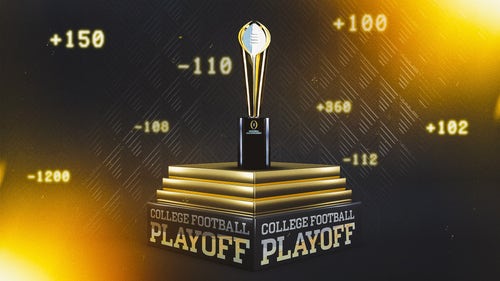
Mailbag: Why a Big 12 expansion wouldn't solve the conference's woes

Like many of you, I've been binge-watching the Netflix docu-drama "Making a Murderer." Among the many, many infuriating moments is when an overexuberant "Dateline" producer covering the Steven Avery trial tells the filmmakers: "Right now, murder is hot! We're trying to beat out the other networks."
We here at the Mailbag would like to think we're a little more sensitive about human tragedies. We are not, however, above shameless audience grabs. Our version is to bring up conference realignment whenever it's even remotely in the news.
So thank you, last week's NCAA convention.
Does the Big 12 finally end its dysfunctional behavior and expand to make a title game meaningful, ending the European caste system imposed on that league by Texas and its Longhorn Network?
-- David C Moore, Salt Lake City
It's unfortunate for the Big 12 that its unique championship model engenders so much criticism, because taken in a vacuum, it's arguably the only Power 5 conference that does it right. Ten is a more logical number of conference members than 14. Whereas a Georgia player can go his entire career without ever playing Alabama, Iowa State plays Oklahoma every single year. And because they all play each other, there's absolutely no dispute as to whether the champion is deserving. After the bowl games you heard a lot of, "Well, Iowa was only the fourth- or fifth-best team in the Big Ten." Well, if that's the case, why was it playing for the championship?
Back on planet Earth, the other conferences aren't going to contract, which means the Big 12 eventually will expand, even if the urgency to do so lessened with the conference title-game rule change. Oklahoma president David Boren is leading the charge. Within hours of the vote, he'd already gone on the offensive, reiterating his stance that the Big 12 will be "disadvantaged" until it gets to 12 members, gets a conference network (which it can't as long as LHN exists) and gets a championship game. His might not yet be the majority opinion, but it will be soon enough. Here's why.
There may be five major conferences as determined on the football field, but in the larger industry of college athletics, we will soon have the Power Two and the Slightly-Less-Powerful Three. Simply put, the SEC and Big Ten are distancing themselves from everybody else. According to USA Today, the SEC earned a staggering $527.4 million in the 2015 fiscal year, its first with both SEC Network and College Football Playoff revenue. That's up 60 percent from just a year earlier. The Big Ten distributed $448 million last school year, and that number should rise considerably with its upcoming TV contract. The Big 12, by contrast, earned less than half that SEC number, though on par with the ACC and Pac-12.
But the answer is not as simple as Boren makes it sound. Even if the Big 12 can get Texas and ESPN to throw in the towel on LHN, even if it does add some combo of BYU, Cincinnati, Houston, UCF, etc., it's no sure thing a Big 12 Network would bring some financial windfall. For one thing, this is an awful time to try to launch a new cable network, what with cord-cutting and all. But even then, the league's footprint is tiny compared with its counterparts. It's got the state of Texas, which is obviously huge, but there simply aren't that many homes in Oklahoma/Kansas/Iowa. Most of all, there aren't enough schools with rabid national fan bases. The Pac-12 Network has struggled for that very reason.
So even if the Big 12 does all the things Boren is suggesting, I see that as a short-term Band-Aid. It still won't put the Big 12 on equal footing with the Big Ten and SEC. At some point down the road -- maybe 10 years, maybe less -- I believe we will finally see some version of Larry Scott's ill-fated Pac-16 concept. A conference with Texas, Oklahoma, USC and Oregon under one roof would command big dollars and end any concerns about poaching from other leagues. If DirecTV still exists in a decade, it will definitely carry that channel.
Until that day, though, the Big 12 will always operate under the specter of an existential cloud.
Does BYU have any hope of playing in a major conference in the next decade?
-- Adam Ferrero, West Jordan, Utah
BYU's best hope is the scenario described above. In the meantime, it's unfortunately stuck in limbo. The Pac-12 is fine with its present structure, thus precluding the most geographically sensible option. The Big 12 most likely will expand, but contrary to what many think, BYU is not at the top of the list of likely invitees. Giving West Virginia a geographic partner or partners is a higher priority. Moving into three time zones is undesirable. And BYU's own TV network, unique scheduling issues (it can't play on Sundays) and radically different mission from those of the existing members are all seen as detriments.
All that being said, it's crazy that BYU is sitting there with a 64,000-seat stadium, a national championship and a Heisman in its trophy case, and a regular eight- to 10-win team, yet is relegated to playing in the Las Vegas or Hawaii bowls. It just goes to show that on-field success, while helpful (it got archrival Utah into the Pac-12), is not the lone prerequisite for expansion invitations.
Is the underclassmen declaration deadline becoming almost as important as signing day? How do coaches manage their scholarships and recruiting targets when you lose five-plus players three weeks beforehand? And will this lead to more boom-and-bust years for elite recruiting programs, similar to Florida State taking a step back this season?
-- Mike Clark, Omaha, Neb.
It's obviously intriguing for those of us who follow the sport closely to find out which stars will or won't be back next season, but it mostly just impacts our already imperfect preseason rankings. For instance, I had Clemson No. 1 in my early Top 25 published the morning after the title game. But after seeing the Tigers lose six key defensive players early (DEs Shaq Lawson and Kevin Dodd, LB Travis Blanks, CB Mackensie Alexander, and DBs Jayron Kearse and T.J. Green), I'd now drop the Tigers below at least Alabama, which saw TE O.J. Howard, S Eddie Jackson and DE Jonathan Allen all somewhat surprisingly return.
It does not, however, affect the coaches as much as you think. For one thing, this isn't basketball, where, for example, Duke coach Mike Krzyzewski was left without a point guard for this season when star Tyus Jones bolted sooner than initially expected last year. Other than a stud quarterback, there's rarely one player that indispensible to a football team. Meanwhile, the coaches account for the possibility of guys leaving -- be it to the NFL, transfer or other -- when putting together a recruiting class.
Ohio State's Urban Meyer likely already had enough scholarship offers out to cover losing at least six or seven of the nine underclassmen who declared. Losing a couple more than he expected just means he goes harder after a couple more of those recruits. (Perhaps not coincidentally, two highly ranked prospects flipped their commitments from Maryland to Ohio State this week.)
Florida State took a step back this year in part because it lost so many NFL-caliber players not just last year but over a three-year span (a record 29). That was bound to catch up to the 'Noles, just as it did LSU a couple of years ago. Worth noting: This year FSU lost just two underclassmen -- DB Jalen Ramsey and K Roberto Aguayo -- while LSU lost just one, OL Jerald Hawkins. That's a major reason I expect both 2015 three-loss teams to contend for the title next season.
Stewart: Clemson, and especially Deshaun Watson, played great against Alabama, but it seems everybody has fallen in love with them. After the game, I saw more articles about Clemson than the winner, 'Bama. They came close to losing several games (I know, they did win them), and although they play a relatively weak schedule next year, do you think they're being set up for a post-heroic failure next year?
-- Carlos, Fort Walton Beach, Fla.
I feel like maybe we read different newspapers? While Watson got plenty of deserved postgame love, I read a whole lot more Nick Saban/dynasty/onside kick/Lane Kiffin stories than I did anything about Clemson. Also, I feel like maybe we watched different Clemson seasons? They let Louisville hang around late in their mid-November game, and Notre Dame had a chance to take the Tigers to overtime. After that there wasn't a whole lot of fourth-quarter suspense until the national title game.
Dabo Swinney's program is here to stay, but of course that doesn't mean they'll reach the national championship game every year. The aforementioned attrition on defense -- which comes just a year after replacing nearly the entire 2014 starting lineup -- is certainly concerning. Conversely, Watson, running back Wayne Gallman, tight end Jordan Leggett and receivers Artavis Scott and Hunter Renfrow all return for what Watson is aiming to be "one of the best offenses ever in college football." So they've got that going for them.
Regardless of the personnel, one thing Swinney will have to deal with that he hasn't before is the "noise" that comes with such elevated expectations. It's not quite what Meyer and Ohio State experienced this past season, but certainly no Clemson team has ever gone into a season with more hype than the 2016 squad will. Meanwhile, Florida State, playing in the same division, gets to play the underdog card for the first time in its entire history as an ACC member. It's going to be fun to watch.
Stewart: Please help me understand how the playoff is hurting other bowls, as you have stated and Ivan Maisel discussed in his Jan. 14 article. Since the inception of the BCS, the only "bowl" that truly mattered was the BCS National Championship Game. None of the other bowls had any impact on the national champion. Under the playoff, now only the semifinals and the title game matter, while the remaining bowls are in the same position as they were previously. So why are so many people linking this "decline of the bowls" to the inception of the playoff?
-- Tom, Salt Lake City
You're using a very jaded and narrow definition of "mattered." Were that true, then you're saying the 2007 Boise State-Oklahoma/Statue of Liberty Fiesta Bowl -- still widely considered one of the greatest games ever played -- did not matter. Or the 2011 TCU-Wisconsin Rose Bowl -- in which I stood on the field afterward watching Horned Frogs players literally sobbing with joy -- didn't matter. Or any number of Big Ten vs. Pac-12 Rose Bowls during the BCS era -- games that drew twice as many viewers as did Iowa-Stanford this year -- didn't matter. Sorry, I do not agree.
I do agree that the gradual de-emphasizing of non-championship bowls by the general public began with the BCS' inception. It became more noticable to me during the last four or five years of that system. But I've definitely seen a more dramatic effect in two years of the playoff than I did in 16 years of the BCS -- which is exactly why it will eventually expand to eight. If only four teams in the country believe they had a successful season, that's going to leave a whole lot of unsatisfied fan bases around the country and a whole lot of 10-2 coaches getting fired.
Remember, just to get to four teams, the commissioners felt compelled to still be inclusive of the bowls, given their longstanding relationships. But the minute they created a playoff, they also assured those games' considerable loss in stature. And we're only two years in. When it comes time for the next postseason incarnation, you will likely see a complete separation of playoff and bowls.
Stewart, This may be a bit off-topic, but as someone who has now been on the West Coast for a few years and seen how the L.A. market is really hot-and-cold for sports, I am curious your take on the Rams moving to L.A. I grew up there, and none of my friends follow pro football. We are all college football/Pac-12 guys. Do you think the Rams will succeed, because we don't. There's too many other things to do on a beautiful Sunday.
-- Sam Willis
Stewart: Will longtime St. Louis Rams fans shift allegiances to the Kansas City Chiefs, "follow" the Rams to L.A. or invest more energy into the Missouri Tigers? I've often heard analysts say that schools in/near cities with NFL franchises are at a disadvantage to programs in more rural areas (i.e. Alabama). Perhaps disgruntled Rams fans who can't stomach shifting allegiances to the other Missouri franchise will follow the Tigers more religiously over the next 10-20 years.
-- Jacob, Augusta, Ga.
While I don't live in L.A., I do spend a considerable amount of time there on football weekends in the fall, and there is no shortage of NFL fans there. In fact, I'm often surrounded by them on my flights home Sunday morning -- they're the ones wearing 49ers and Raiders jerseys heading to one of their home games. Like with any L.A. team -- including USC and UCLA -- the Rams will be a huge draw if they go 12-4, and they'll play in front of 40,000 empty seats if they go 6-10. The fact that there are still die-hard Rams fans there from 20 years ago certainly helps, and I'm sure they'll develop new ones. The L.A. and Orange County markets already support two MLB, two NBA and two NHL teams, so finding enough people to root for one (for now) NFL team should not be that hard.
As for the jilted St. Louis fans -- I don't have a good pulse for that, despite being married to a city native, though I find it hard to believe they'd look favorably on the Chiefs. Mizzou already has a pretty dedicated fan base; the problem is, they share the state with Kansas and, in St. Louis in particular, Illinois. So even if a few disgruntled ex-Rams fans decide to take a greater interest in college football next season, it's no guarantee they'd choose Mizzou. Though given the other options . . . yeah, they probably would.
Dear Stewart, Several schools have made big-name coordinator hires recently. Which do you believe will have the biggest impact on the 2016 season? Which coordinator hires have made a big splash recently, but won't likely translate into more wins next year?
-- Will West, Hewitt, Texas
I don't know if you want me to answer this. Last year I said it would be Auburn defensive coordinator Will Muschamp or Texas A&M defensive coordinator John Chavis. Their teams won a combined six SEC games. And yet despite that . . . I'm going back down the SEC well.
I love Tennessee's hire of Penn State's Bob Shoop and LSU landing Wisconsin's Dave Aranda. Both have had tremendous success in their previous stops running schemes that fit well with the personnel on hand. Both teams have a lot of young talent just waiting to be molded. LSU in particular is making a huge upgrade from the well-traveled Kevin Steele, now at Auburn, and Shoop is returning to the state where he enjoyed considerable success with Vanderbilt just a few years ago.
On the flip side, I really like Brady Hoke as a defensive coach, but I'm skeptical how much impact he'll have his first year at Oregon. There's not a lot of talent there up front, as we saw this past season, and it's going to be a huge adjustment from ultra-traditional Michigan to ultra-modern Oregon. That tempo offense often puts a strain on the defense. I do think he'll have success over time, but given the attention he's going to receive, that first year could be rough.
In five years, who will the top five coaches in the FBS be?
-- Jeff Imboden, Brecksville, Ohio
Five years is a long time. I'm not sure I can even name with certainty five guys who will still be FBS coaches. By then they may all be fired, retired, moved on to the NFL, or, in Bret Bielema's case, moved to Hollywood.






